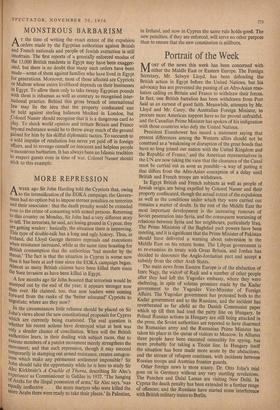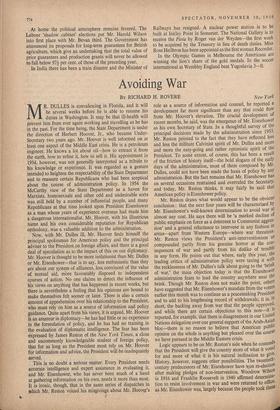Portrait of the Week
MOST of the news this week has been concerned with either the Middle East or Eastern Europe. The Foreign Secretary, Mr. Selwyn Lloyd, has been defending the British action in Egypt before the United Nations, but his advocacy has not prevented the passing of an Afro-Asian reso- lution calling on Britain and France to withdraw their forces. In fact, one British battalion has been withdrawn from Port Said as an earnest of good faith. Meanwhile, attempts by Mr. Lloyd and Mr. Casey, the Australian Foreign Minister, to procure more American support have so far proved unfruitful. and the Canadian Prime Minister has spoken of his indignation with those countries who defy the United Nations.
President Eisenhower has issued a statement saying that present differences among the Western allies should not be construed as a 'weakening or disruption of the great bonds that have so long joined our nation with the United Kingdom and the Republic of France,' and the American representatives in the UN are now taking the view that the clearance of the Canal must be carried out as soon as possible—a way of putting it that differs from the Afro-Asian conception of a delay until British and French troops are withdrawn.
In Egypt British and French subjects as well as people of Jewish origin are being expelled by Colonel Nasser and their property confiscated, though the actual extent of the expulsions as well as the conditions under which they were carried out remains a matter of doubt. In the rest of the Middle East the most important development is the increasing rumours of Soviet penetration into Syria, and the consequent worsening of relations between Syria and her neighbours, particularly Iraq. The Prime Ministers of the Baghdad pact powers have been meeting, and it is significant that the Prime Minister of Pakistan should have delivered a warning about subversion in the Middle East on his return home. The Libyan government is to re-examine its treaty with Great Britain, and Jordan has decided to denounce the Anglo-Jordanian pact and accept a subsidy from the other Arab States.
The main news from Eastern Europe is of the abduction of Imre Nagy, the wido0 of Rajk and a number of other people after they had left the Yugoslav embassy, where they were sheltering, in spite of solemn promises made by the Kadar government to the Yugoslav Vice-Minister of Foreign Affairs. The Yugoslav government has protested both to the Kadar government and to the Russians, and the incident has reverberated as far afield as the Danish Communist paper which up till then had toed the party line on Hungary. In Poland Russian actions in Hungary are still being attacked in the press, the Soviet authorities are reported to have disarmed the Rumanian army and the Rumanian Prime Minister has taken his place in the queue of visitors to Moscow. In Albania three people have been executed ostensibly for spying, but more probably for taking a Titoist line. In Hungary itself the situation has been made more acute by the abductions, and the stream of refugees continues, with incidents between Russian troops and Austrian frontier guards.
Other foreign news is more scanty. Dr. Otto John's trial goes on in Germany without any very startling revelations. The Panchen and Dalai Lamas are visiting New Delhi. In Cyprus the death penalty has been extended to a further range of offences; and the Russians have started some interference with British military trains to Berlin. At home the political atmosphere remains fevered. The Labour 'shadow cabinet' elections put Mr. Harold Wilson into first place with Mr. Bevan third. The Government has announced its proposals for long-term guarantees for British agriculture, which give an undertaking that the total value of price guarantees and production grants will never be allowed to fall below 97i per cent. of those of the preceding year.
In India there has been a train disaster and the Minister of Railways has resigned. A nuclear power station is to be built at Inkley Point in Somerset. The National Gallery is to receive the Pieta by Roger van der Weyden—the first work to be acquired by the Treasury in lieu of death duties. Miss Rose Heilbron has been appointed as the first woman Recorder.
In the Olympic Games in Melbourne the Americans are winning the lion's share of the gold medals. In the soccer international at Wembley England beat Yugoslavia 3-0.



















































 Previous page
Previous page